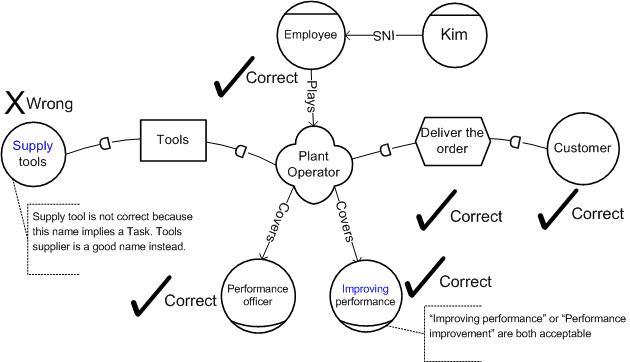This stable version of the Guideline Wiki Page displays the guideline as per the i* Style of the University of Toronto. Registered users can use 'Open Version' link right at the end of the guideline statement below to access the open version of this page
Guideline (Beginner,Naming) Do not use Verb Phrases to name Actors, Agents or Positions. Open Version
Discussion: Names of Actors, Agents, and Positions should not be Verbs. Avoiding using Verbs in these elements helps in eliminating readability conflict with Tasks, which are described by Verbs. Agent names can use general names such as “Employee” or specific names such “Judy”. Roles are different than Tasks. Tasks are used when an actor (Depender) depends on another actor (Dependee) through the strategic Dependency Link, to accomplish a task, which has a clear idea of achieving it. The Dependee, however, still has freedom to carry out the activity within some constraints. A Task is usually is described by decomposing it into sub-elements, which could be another task, softgoal, goal, or resource. Also, Tasks don’t always have to be involved in a dependency. An actor can have internal tasks, which are not involved in a dependency. In contrast, a Role is not a Task but an abstract characterization, which is played by an Agent or Covered by a Position. Also, A Role is specific type of an Actor, which can contain its own elements such Goals, Softgoals, Tasks, and Resources. Therefore, it should not be confused with Tasks, which are just one possible element of a Role. Also, not only human Actors can play Roles, but also nun-humans (such as systems) can play Roles.

For questions regarding i* syntax please click on the "discuss" tab. This feature is available for registered users only. For registration information please see the Registration and User Rights Policy for the i* Wiki.
